WRITTEN BY MAX MCGUIRE ’24
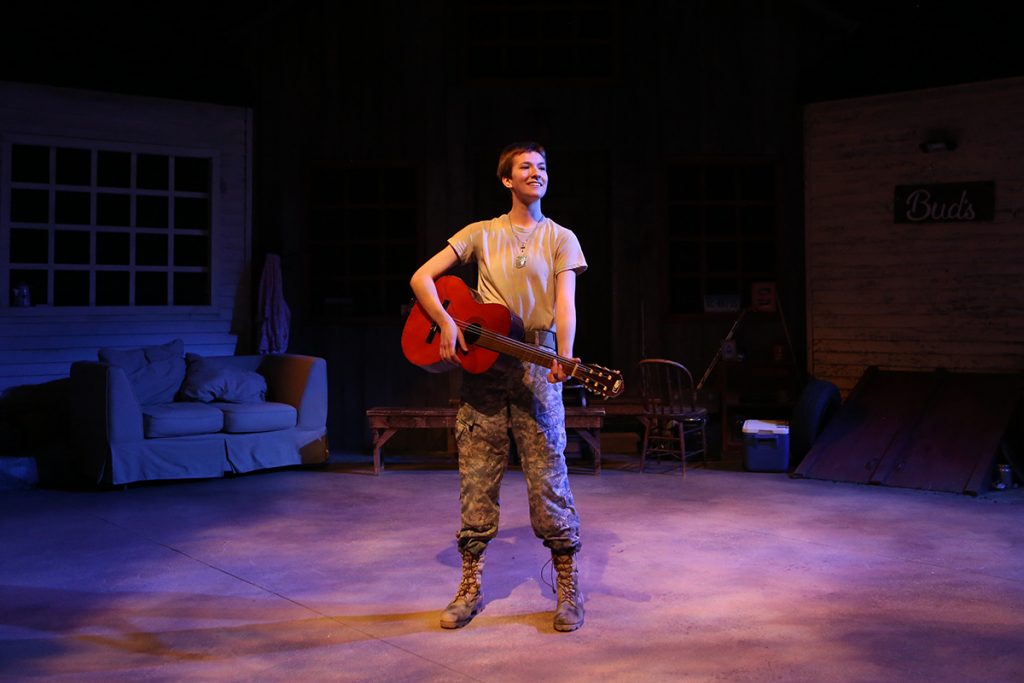
The Place That Made You by Darcy Parker Bruce is a story about loss, grief, and found family; prior to seeing it on opening night, I knew that this play was going to hit close to home. Very much like the story that unfolds onstage, I grew up queer in a small town in rural Connecticut with one parent who happens to be an EMT. However, nothing could prepare me for the emotional journey that I underwent in watching The Place That Made You from beginning to end which captivated me in every detail. My highest compliments go to Tait Brencher (‘23), who directed this play and who brought together an excellent team to execute Darcy Parker Bruce’s vision.
The Place That Made You is the second play in what is called “The Piedmont Cycle”, of which two of the four plays have been written. To give readers an idea of where The Place That Made You is set, Piedmont, Connecticut is not a whole town but rather a small section of Darien, Connecticut. Like most towns in Connecticut, Piedmont is a town that you’d drive through on a long road trip, but never stop to experience its mere existence. I recall in Theater Company two weeks ago, the cast and crew of the show described it as “a play that was written like a film”, and the production very much translated that way on the stage. Each scene bounces back and forth between time, location, and the realms of the living and the dead. Such is so because the play follows two characters, childhood friends Jonah and Ben, one alive and the other dead.
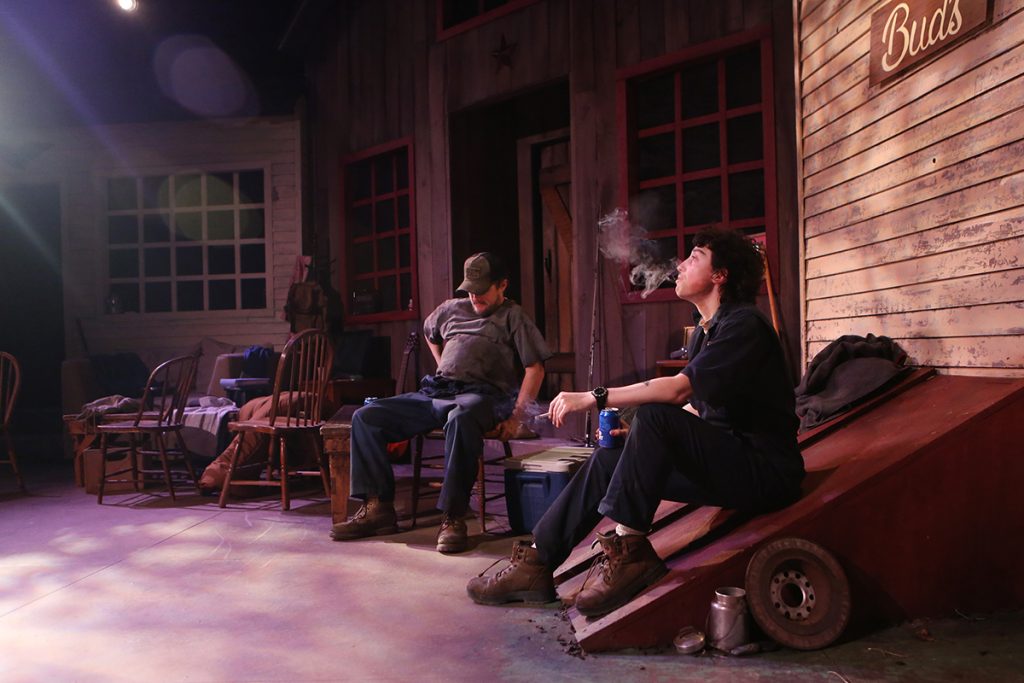
While the first act of the play follows Jonah’s guilt in not accompanying Ben into the army, which is assumed to have stripped Ben of the protection that could have prevented his death, the second act focuses more on the characters’ relationships and what happened to Ben. However, because the play is part of a cycle, the ending leaves the audience on a cliffhanger, making them seek clarifying answers that only the upcoming plays can provide. However, I think what makes The Place That Made You particularly moving is how, despite the presence of a ghost on stage at almost all times, the play reflects reality. In real life, we don’t always get the answers or the closure we want, but in the wake of change, we have to keep on living.
The play begins with Ben already dead, having died during his time stationed in Syria. His father, Bud, as well as Emily, her husband Brendan, and Jonah must all learn to live in his absence. The way in which Darcy Parker Bruce writes their characters makes them feel real, which is to say that Bud, Jonah, Emily, Brendan, or Ben could be anyone that you know. In fact, they very much do feel like many of my neighbors from back home. One particular scene that made me tear up was in the second act when Emily questions whether or not her choice to marry Brendan was a mistake. After her miscarriage in the first act, Brendan and Emily’s marriage gradually falls apart, with Emily finding herself in continual frustration at Brendan’s constant going “out” to escape the house. As she tells Jonah of her marital issues, the immediate assumption is that Brendan is out with friends, drinking, or maybe with another woman- that is, until Brendan comes home wearing an EMT uniform. As the scene continues, Brendan sits in the other room listening to his radio until he is called to go out again. This scene was incredibly emotional because it perfectly depicts the reality of having a family member who is an EMT- they will always be coming and going and are almost never home. As difficult as the situation may be, there is nothing anyone can do about it. Such hardship comes with the territory of the job, and while it’s easy to feel as if it is your fault that they’re always away, deep down you know that they’re simply keeping people safe. I want to commend the way in which the actors so authentically depicted grief, not only through their performance of Parker’s writing but through their physicality, and their choices.
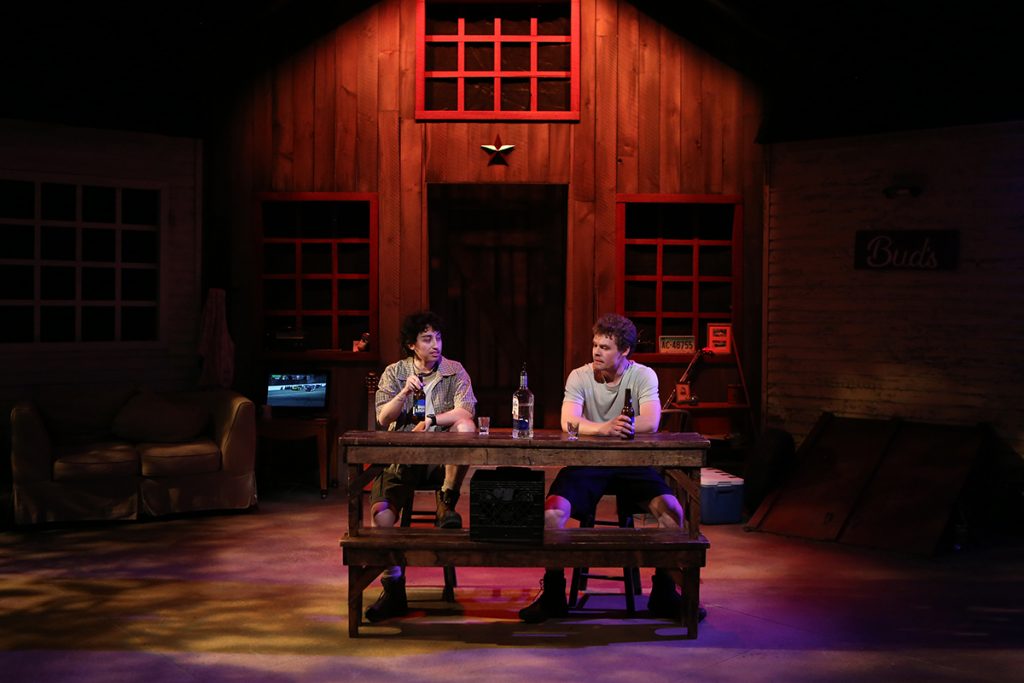
Furthermore, I wanted to discuss the underlying queerness in The Place That Made You. Jonah is a trans-masc individual who uses he/him pronouns while Ben is a trans-masc genderqueer individual who uses she/her pronouns in the show but they/she/he pronouns in the script. Often in media that contain queer people and queer relationships, I have found that queerness is either made to be the butt of the joke or the catalyst of a romantic affair. Sometimes, queerness is killed or made to disappear before the end of another character’s development. While Ben dies in the play, queerness in The Place That Made You was explicative and not used as a plot device. Queerness exists, and while there are people in Piedmont who will never be able to accept Jonah and Ben, their found family accepts them.
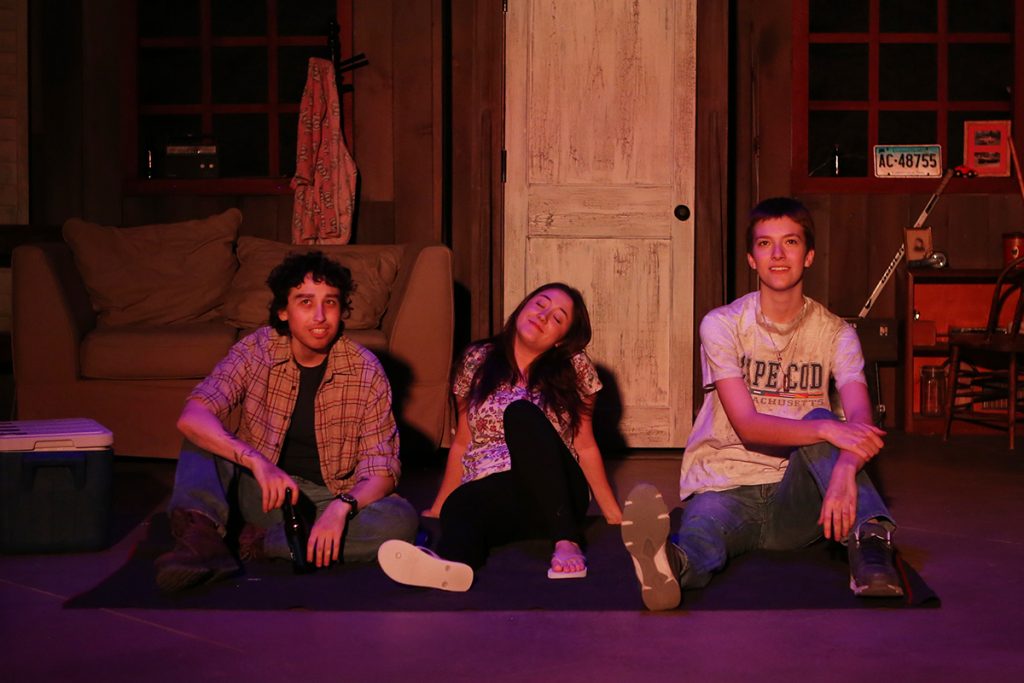
A major aspect of Jonah and Ben’s friendship is Ben’s willingness to kill for Jonah, evidenced by (spoiler), Ben shooting Jonah’s abusive father before he goes off into the military. In return, Ben asks Jonah stay alive in the wake of his death as he goes off into the Kingdom of Ghosts to find his shadow, a symbol of his soul. My congratulations to Maddie Evans (‘24), who plays Jonah, and Lillie Shelor (‘25), who plays Ben, on their debut as leads in a seminar production here at Skidmore. The way in which Evans and Shelor interacted on stage felt like long-lost friends who were reuniting after years of being apart. The onstage chemistry of the two actors helped portray the bittersweet tragedy of not being able to let go of a loved one who has passed away.
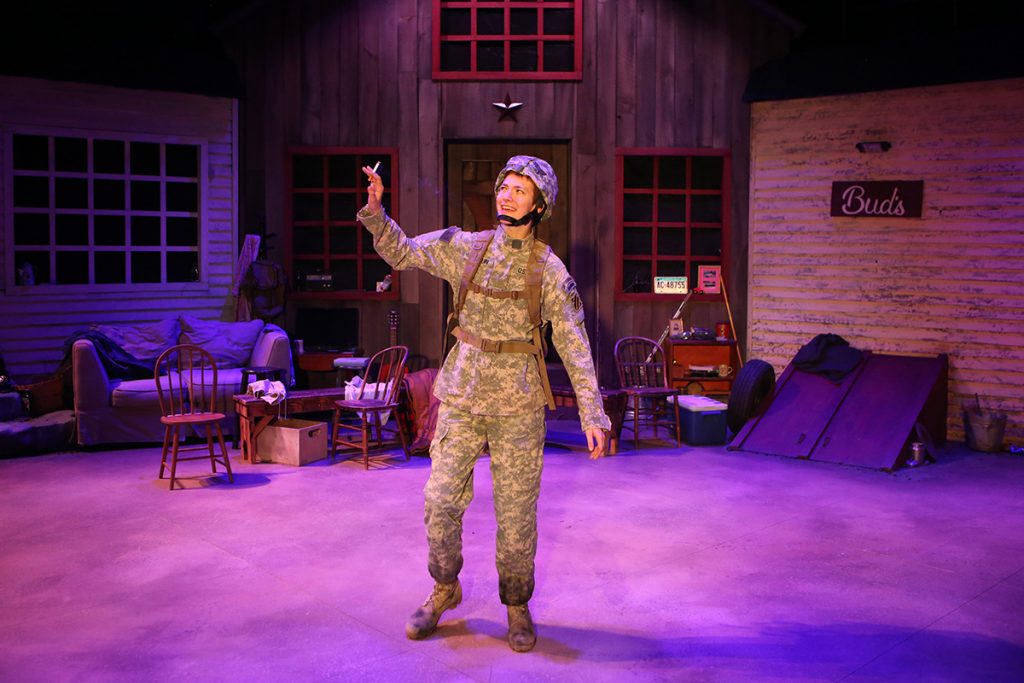
Not only was the storyline of The Place That Made You incredibly moving, but the physical set and visual elements of the black box production helped bring Piedmont to Saratoga Springs. For starters, each scene was introduced with a title card projected through a TV screen, as if they were chapters of a novel or film. While the physical set consisted of three doors, each of which belonged to Emily, Ben, and Jonah, the use of moving set pieces and lighting helped create an atmosphere, no matter the location of each scene. One minute the audience is in small-town Connecticut where neighbors keep piles of junk in their yards, and the next they’re in the Kingdom of Ghosts, looking for Ben’s shadow. Not only did the set pieces move onstage, but whenever Ben would begin to remember how he died, a lawn chair would drop from the ceiling, signifying the place that made Ben: Syria, Piedmont, the Kingdom of the Ghosts, and the place where he killed Jonah’s father.
Lastly, this review would not be complete without mentioning the production’s usage of silhouettes. Any time Ben would chase after his shadow, a silhouette of Lillie would be projected on the walls of the set in flashes, as if the shadow was physically slipping away from Ben. Similarly, towards the end of the second act, the use of silhouette helped to create a beautiful image of the whale, as it is projected all around Jonah in mesmerizing blues and purples. Like a ghost, the motif of the whale haunts the narrative; the whale is mentioned throughout the show as it physically washes up on the shoreline. The whale is also a form of religious imagery, represented by the moment Bud gives Jonah the Bible with the story of “Jonah and the Whale” specifically bookmarked. I also believe the whale represents Jonah’s grief, reflecting the quote from “Jonah and the Whale ” that Jonah continuously repeats throughout the play- “I have the right to be angry- so angry that I want to die”.
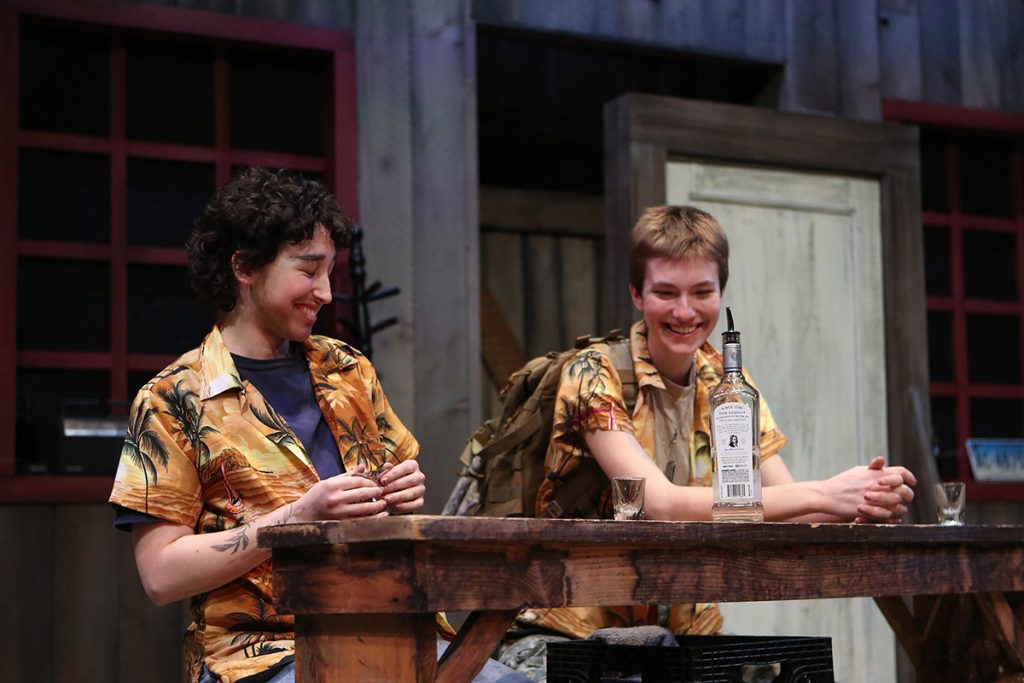
There’s so much to say about The Place That Made You, and not enough words in the dictionary to describe how powerful it is. To watch this play is to be a spectator from the outside, looking in on a slice of life in a small town; more profoundly, it is to be Ben, watching how life goes on after you have died. Without seeing any of the other plays in the Piedmont cycle, the story of The Place That Made You stand alone is impactful because it evokes a feeling, even if momentary, of belonging to the world. With that, spectators have the privilege of witnessing the depth of the emotional landscape, grieving, and rejoicing in tandem with the characters. In the most authentic and genuine way possible, The Place That Made You makes you think about just how ephemeral it is to be alive, and how quickly life can be taken from you. Someone once told me, when dealing with grief, “you never get over it- you only get through it”, a heartfelt message that I think, The Place That Made You reflects perfectly.
Photos by Susan Kessler
***
Max McGuire ’25 is a staff writer for the Skidmore Theater Living Newsletter
